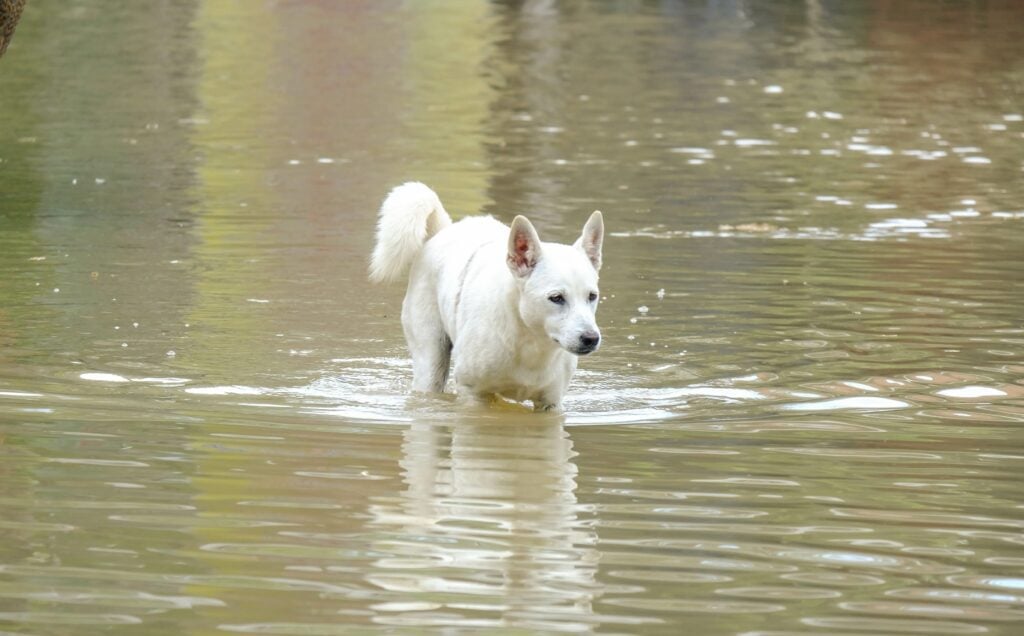Unpredictable weather events, fueled by the climate crisis, are putting animal rescue organizations under extra strain, the International Fund for Animal Welfare (IFAW) has said.
A steep rise in the frequency of extreme conditions is hampering global efforts to help all wildlife, livestock, and companion animals in need. In line with this, IFAW reports that it has had its busiest year to date. Its specialist emergency responders are now stretched beyond their limits.
The Disaster Response and Risk Reduction team is responsible for reducing animal suffering before, during, and after a natural catastrophe. It is dismayed at its ongoing workload.
“Disasters are hitting communities that are still in recovery from their last disaster,” Shannon Walajtys, IFAW’s Director of Disaster Response and Risk Reduction said in a statement.
“Houses are still tarped, and public works infrastructure is still damaged, making these structures more vulnerable. We can barely keep up.”
Walajtys points the finger of blame at the worsening climate emergency. She states that anthropogenic destruction of natural ecosystems is a root cause of the climate crisis. It is also, she says, a contributor to subsequent extreme weather patterns.
Animal agriculture for meat production is a major contributor to the climate emergency, necessitating vast deforestation and generating enormous amounts of methane.
The World Meteorological Organization and UN Office for Disaster Risk Reduction agree that the climate crisis is making extreme weather more common. Last year, they released research findings that point to a surge in natural disasters in the last 50 years.
Building grassroots support
To account for the increasing number of necessary rescues, IFAW consistently invests in restoring natural ecosystem health. But despite these efforts, mobilizing more volunteers is key.
Building vast community networks that are able to respond quickly and within a local vicinity is a focus for IFAW. It wants to get to any emergency quickly, even if only in a “first eyes on the situation” role.
“We complement that strategy with boots on the ground. We have local responders who have very specialized skill sets in animal care and control with all species of wildlife, companion animals, and livestock.”
The vast number of rescue missions that IFAW has attended or supported financially underscores the need for such strategies. The diverse range of disasters experienced in just one year is also an indicator that the climate emergency is worsening.
So far in 2022, Walajtys’ team has helped rescue animals from floods, droughts, tsunamis, and wildfires, either with manpower or funding.
No two rescues are the same
Earlier this year, flooding in Australia left native species, including koalas and kangaroos, at risk of being swept away and killed. Many baby animals are orphaned during such events. This motivated IFAW to move quickly as torrential rain showed no sign of easing. Emergency grants were given to local nonprofits and animal shelters, alongside food, generators, and even heartbeat simulators, to care for young creatures.
Meanwhile, similarly serious flooding in Kentucky saw companion animals as the main source of concern. Volunteers were dispatched to find missing family members and other animals. Many had been swept away by surging waters and mudslides. Found animals were then reunited with their owners, while wildlife was treated for injuries and released safely.
IFAW has recently been heavily involved in rescue efforts following severe flooding in Pakistan. As a result of the devastating event, estimated to have claimed the lives of around 1,500 people so far, UN Secretary-General António Guterres echoed Walajtys’ thought that the climate crisis is linked to natural disasters.
“We are heading into a disaster. We have waged war on nature and nature is tracking back and striking back in a devastating way. Today in Pakistan, tomorrow in any of your countries,” he said.






